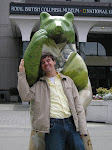Top 10 Reasons to See Oblivion
- Performances range from July 8 to the 25th, each on a different day of the week. If you're in town, you'll be able to catch one of them!
Dante's Inferno, The Bible (Job, Proverbs, and Sirach), and poetry by Samuel Butler, Omar Khayyám, Sakyong Mipham Rinpoche, Wallace Stevens, William Carlos Williams (second book), and William Butler Yeats.
at the 2010 Capital Fringe Festival:
From specialty interests to practical concerns to existential questions, there are loads of reasons to attend Oblivion, a one-act opera premiering July 8-25 in DC. Here are 10 of the best:
10.) Possibly my final stage work in the DC region - For those who know and enjoy my work, this premiere is not to be missed. My doctoral graduation is just over one year away, meaning my upcoming job search could land anywhere in next couple of years!
9.) A "once every 3-4 years" event - I can produce a sound design in a couple months, an art song in a couple of days. But operas are truly long-term creative investments. My next long-term project, a planned 3-act opera based on the incredibly operatic life of Baroque librettist Pietro Metastasio, likely won't be ready until at least 2013.
8.) 5 chances to see it
7.) Multi-source Libretto - In addition to Lovecraft's short story and my own original poetry and prose, the libretto borrows liberally from a variety of interesting poems and other writings. See how many you can identify in the show! Here is a complete list:
The Qur'an,
6.) New Music in D.C. - For all you music and theater aficionados, this is about as new and local as it gets. The score is fresh off the press. All the Oblivion team has some degree of local ties, and I've lived in the DC area almost continuously since 2005. What's more, the narrative is somewhat non-traditional in that half the scenes take place in a plotless dream-world. We're taking chances - take a chance on us!
5.) Classical Guitar - If you've never had the pleasure of seeing and hearing a classical guitar live, here's your chance. I absolutely fell in love with the sound of this instrument a few months ago, and I can't wait to start writing for it again soon.
4.) Singing Bowls - pitched gongs/bells in the shape of a bowl, these Himalayan instruments are either stuck or "sung" by vibrating the rim with a stick. Used in meditation, spiritual practice, healing, and high-quality contemporary music. Two of the bowls in this production were purchased locally at Silk Road and Eastern Market in DC.
3.) H. P. Lovecraft - This giant of the early science fiction and horror genres (back then, it was called "weird fiction!") is best known for his vivid fantasy-worlds and terrible mythical creatures. His work has been lauded by Joyce Carol Oates and Stephen King. The tiny short story upon which my opera is based fits on a single page, leaving the opportunity to expand and deepen the story. Also, it eschews other-worldly creatures in favor of a direct experience with its subject.
2.) Serious exploration of the question of existence and the end thereof - Almost immediately after my light-hearted musical, The Eden Diaries, premiered in 2007, I was ready for a more serious subject. (The source was a pair of Mark Twain short stories!) Months later, my grandfather passed away. This simmered in the back of my mind and resurfaced in 2009 when I sought an operatic topic. Hence the non-traditional source, narrative, and ensemble.
1.) The future of opera - All self-promotion aside, I firmly believe that this is the formula for successful new operas: no more than 90 minutes, no more than 12 singers, no more than 12 instruments, unique subject, challenging narrative, focus on creative storytelling, some material you can leave humming, and integral connections to other areas of entertainment, culture, interest, inspiration. We've got all of these.
Unless you're writing for a medium- to large-sized established opera company, this is what people want. And by that I mean, this is what I want! (Funny that my next planned opera is the opposite - a grand opera in the late Baroque tradition... but that's a product of the subject matter, and a challenge for the future!)


No comments:
Post a Comment